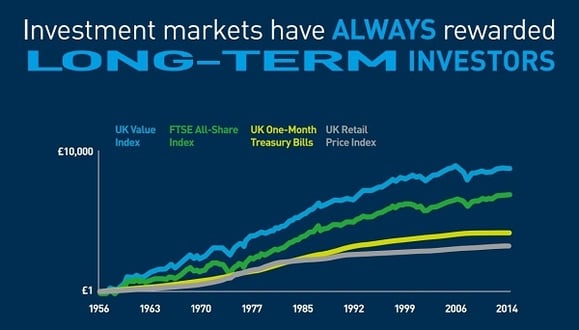

[Estimated time to read: 7 minutes]
Continuing my age-specific investment guides, as suggested by Qatar expat Jennifer Johnson, today I’m going to talk through securing and growing money when you’re in your fifties.
From 50 onwards, you may be thinking about retirement, and how best to plan for it.
However, conflicting information - including regular changes to pension rules in the UK - may be confusing you, and the daunting prospect of having enough money to retire on may be overwhelming you.
I want to take this burden off you – because there are 5 positive steps you can take to get in the best financial health possible.
![]()
#1. Make a plan
As you are in your 50’s, it’s definitely time to evaluate your current position in relation to your retirement goals.
I suggest you write your life goals and all your numbers down, and get them professionally analysed.

Now is the right time to make any necessary adjustments to your savings, investments and debt position to help you enjoy a successful retirement.
However, unless your goals are clearly defined, and your financial position is robustly structured, you may not end up where you want to be in retirement.
#2. Make the most of what you’ve got
How much money have you got squirreled away, where is it and how is it performing?
In the UK, it’s estimated £15 billion of unclaimed financial assets lie in old bank accounts, pensions, life assurance and investments.
If you think you may have lost track of some of your old accounts, use the tools on MoneySavingExpert.com to find lost money.
Next, having made a note of where your money is invested and how much each account contains, it’s time to get your performance benchmarked and your fees checked.
Why?
Because if you’re paying too much in fees, which is very common, your wealth’s growth will be restricted and undermined.
As Benjamin Franklin said:
“Beware of little expenses. A small leak will sink a great ship.”
Also, if your money is incorrectly diversified, your portfolio hasn’t been rebalanced, or it’s being overly actively managed, your performance could be below what it should be.
These factors can have a critical impact on how much money you have to retire on.
Whether you need to make some drastic changes or you are on the right track, without analysis, you won’t know.
#3. Eliminate debt
Thomas Fuller said: “debt is the worst poverty” - and in retirement this is certainly true.
Eliminating consumer and mortgage debt should be your focus ahead of retirement, as it will free up funds, and make financial decisions much easier to take.
By eliminating debt, you need make smaller withdrawals from your investment management portfolio when you retire – leaving greater room for ongoing investment growth.

However, if you carry debts into retirement, and if investment returns falter with a market correction for example, you could end up in difficulties.
With no debt, a short-term market correction is not a problem for most people, they can just adjust their living expenses temporarily.
#4. Invest, but invest appropriately
During the early stages of your earning and investing life, things were relatively simple; you earned as much as you could, saved as much as you could, and hopefully invested that money wisely.
But now you’re entering a stage of life where you need to plan for retirement income needs, review your overall plan, and consider your risk exposure.
As proponents of passive investing, we maintain that building a portfolio of index funds is still the best approach to growing wealth at any life stage.
The evidence proves it’s the lowest cost, highest returning, most consistently successful investment method.

However, there are many index funds to choose from, and when it comes to investing in your fifties, you need to think carefully about asset allocation, diversification and risk.
If you choose to invest 100% in equities, you’re obviously going to be exposed to potentially greater risk.
Considering that since 1900 markets have endured a correction every year, do you want to expose all your invested wealth to this potential risk?
Before you run screaming for the hills, however…
Despite corrections, if you track the efficient market you will benefit from compounding by leaving your money well alone, and you will, on average, double your money every 7 years…
So, the closer you get to retirement, be aware of the risks of investing, but don’t forget the benefits either!
Building a passive portfolio with a mixture of equities and bonds might be the right approach for you.
And whatever asset mix you choose, ensure you still commit to investing every single month to benefit from pound cost averaging.
In your fifties it is still appropriate to commit to a passive approach to investing, because no matter when you plan to retire, even if it is in a few short years, much of your wealth will remain invested for far longer.
I.e., just because you’re retired that doesn’t mean you will need to take every penny out of your investment the day you stop working
Leaving your invested wealth alone – for the long-term (yes, this still applies in your fifties!) to continue growing, whilst drawing an income from it, will still be the best approach to your long-term financial health.
And trust me, saving money into a cash account instead is not the best thing you can do for your money – as Warren Buffett says:
“We pay a high price for certainty.”
I understand you may be fearful of investing as you approach retirement, so let me reassure you with some evidence.
The Schwab Center for Financial Research studied the financial impact of market timing in a bid to find out if there was any basis for this universal fear.
They assumed hypothetical investors had $2,000 to invest once a year, every year for 20 years from 1993 onwards.
The perfect hypothetical investor timed their annual investment at the very lowest point of the market and returned $87,004 over 20 years on a $40,000 investment.
The worst hypothetical investor timed their annual investment at the very highest point of the market – and returned $72,487 over 20 years on a $40,000 investment.
The worst performer was the cash investor who, during a time when interest rates were much better than they are today, ended up with just $51,291 on a $40,000 investment because they saved instead of investing – i.e., they paid a high price for certainty.
#5. Get help and advice from the right sources
From benchmarking and improving your current pensions, savings and investment accounts – to choosing the right mix of index funds for your secure financial future, it will be critical to seek best advice.
It is important to consider a fee-only professional to limit any potential conflicts of interest.
Why?
Because those who market their service as ‘free’ are paid commission when they sign you up for a savings, pension or investment product.
Fee-only advisers charge an agreed up front transparent amount for their professional services instead – and are therefore unbiased by commission.

Because securing your retirement is one of the most important financial life projects, choose to work with a chartered financial planner or chartered wealth manager, both of which are fiduciary roles.
A fiduciary, as opposed to a salesperson or IFA, is duty bound by professional accreditation to put your interests above all else.
Now do this!
Request for a X-Ray Report TM and benefit from professional help.
We will look at each pension, savings or investment account you already have, and deliver the facts about current performance and fees.
Where you can make savings and improvements, we will tell you. You’re then free to implement these recommendations yourself, or we can do them for you.
Making the most of what you’ve got is the first step to financial freedom, and now is the right time to make any necessary adjustments to help you enjoy a successful retirement.
We are fee-based, chartered financial planners and wealth managers, and we have the highest pension and retirement planning qualifications and international regulation.
Therefore, we can help you with every single step of the foregoing advice.
Why do it yourself and risk making a mistake, when we can do it all for you and take the entire burden off you?
Request for your X-Ray Report TM right now, and let’s get started planning and preparing for your financial future.
P.s., if you’re in your 60s, tomorrow I’m going to deliver you a comprehensive retirement-ready solution, so that you can get in the best financial shape in the shortest possible time.

